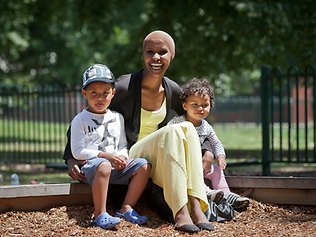Australian
Sunday, December 02, 2012
BY: RACHEL BAXENDALE

Rahma Abdirahman, 26, with her children Adam, 3, and Sabrina, 16 months, spent seven years in a refugee camp in Kenya Picture: Jake Nowakowski Source: The Australian
RAHMA Abdirahman has a blunt message for the Gillard government. The Somalian-Australian, 26, believes a scheme to place asylum-seekers in the community without work rights will lead to crime, disengagement, poverty and an increase in illegal work.
"Our government is always talking so much about multiculturalism. This kind of thing isn't going to help people live together," she said.
Her view is echoed by former refugees, charities, community groups and migration experts, who say it is a recipe for disaster.
Ms Abdirahman spent seven years in a refugee camp in Kenya, before coming to Australia aged 12 with her mother, brother and sister, after their doctor father died during civil war in Somalia.
The psychology student now lives in Werribee, in Melbourne's southwest, with her husband and children, Adam, 3, and Sabrina, 16 months. Her brother, 22, works as an electrician, while their mother still lives in the Flemington public housing where Ms Abdirahman grew up and refugee families have been housed since the 1960s.
Delays of up to 10 years for public housing in areas such as Flemington, northwest of Melbourne's CBD, mean most newly arrived families move to outer suburbs and regional centres with fewer resources and support networks.
Ms Abdirahman said that reality, combined with the federal government's plan to place asylum-seekers who arrived after August 13 in the community on $430 a fortnight, with no work rights, would lead to alienation.
"If people don't have anything to do and they don't have any other way to make money, they'll turn to drugs," she said.
Ms Abdirahman's mother Khadija Alihashi, who worked as a midwife in Somalia and now works in childcare, said refugees needed to be given opportunities to contribute.
"If you've had your husband killed and your sister raped, and spent years in a refugee camp, you need to be able to go into a community and find work to look after yourself and your family," Mrs Alihashi said. "No matter where we come from, we're all humans."
She said it was counterproductive to have asylum-seekers in the community and not let them work.
Farnham Street Neighbourhood Learning Centre Coordinator Cathy Connop has worked at the Flemington centre, which provides a wide range of adult education and social support programs, for 23 years.
"It puts pressure on to all the services to keep them living from week to week, whereas if people actually are able to work, they contribute to the community, they pay taxes, and their skills are of value," Ms Connop said.
Immigration Minister Chris Bowen last week indicated the government might be prepared to consider "some mechanism" to enable refugees awaiting permanent protection to support themselves. A spokesman for the minister said there were already 18,000 people in the community on bridging visas with no work rights and fears the policy would create an underclass were unfounded.
Monash University immigration expert Bob Birrell said asylum-seekers without work rights would have a "very powerful motive" to work illegally.
He said those in detention awaiting temporary protection visas that would not grant them work rights would have similar motives to attempt to abscond.
Last month the Immigration Department released records showing 129 asylum-seekers had escaped from detention between October 2009 and June 2011, with 33 still missing. "This is an extremely invidious situation," Dr Birrell said of the plan to deny asylum-seekers work rights. "It makes me wonder who could possibly have come up with it.
"Even when the Coalition was pursuing the Pacific Solution, they had to back off on Temporary Protection Visas and Nauru."
National Director of UnitingJustice Elenie Poulos said the plan would have devastating effects on the mental and physical wellbeing of already traumatised people.